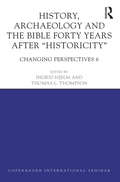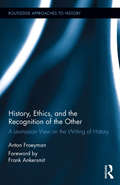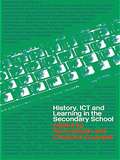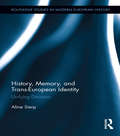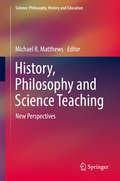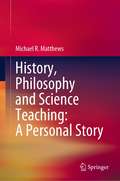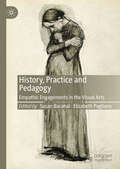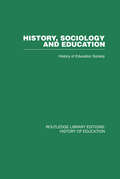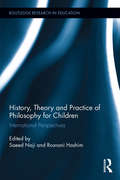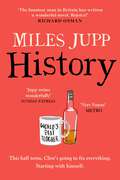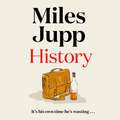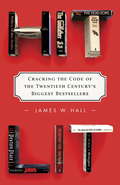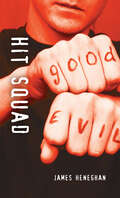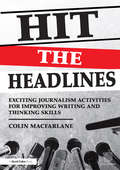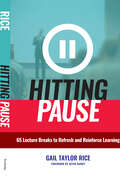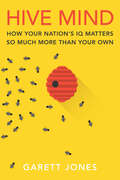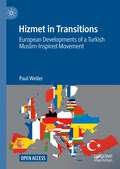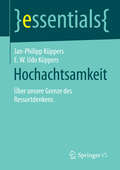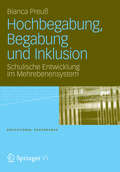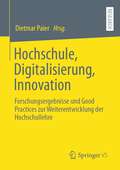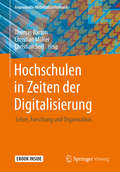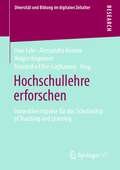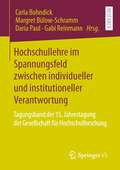- Table View
- List View
History, Archaeology and The Bible Forty Years After Historicity: Changing Perspectives 6
by Thomas L. Thompson Ingrid HjelmIn History, Archaeology and the Bible Forty Years after "Historicity", Hjelm and Thompson argue that a ‘crisis’ broke in the 1970s, when several new studies of biblical history and archaeology were published, questioning the historical-critical method of biblical scholarship. The crisis formed the discourse of the Copenhagen school’s challenge of standing positions, which—together with new achievements in archaeological research—demand that the regional history of ancient Israel, Judaea and Palestine be reconsidered in all its detail. This volume examines the major changes that have taken place within the field of Old Testament studies since the ground breaking works of Thomas Thompson and John van Seters in 1974 and 1975 (both republished in 2014). The book is divided in three sections: changing perspectives in biblical studies, history and cult, and ideology and history, presenting new articles from some of the field’s best scholars with comprehensive discussion of historical, archaeological, anthropological, cultural and literary approaches to the Hebrew Bible and Palestine’s history. The essays question: "How does biblical history relate to the archaeological history of Israel and Palestine?" and "Can we view the history of the region independently of a biblical perspective?" by looking at the problem from alternative angles and questioning long-held interpretations. Unafraid to break new ground, History, Archaeology and the Bible Forty Years after "Historicity" is a vital resource to students in the field of Biblical and East Mediterranean Studies, and anyone with an interest in the archaeology, history and religious development in Palestine and the ancient Near East.
History, Ethics, and the Recognition of the Other: A Levinasian View on the Writing of History (Routledge Approaches to History #17)
by Anton FroeymanThis book introduces a new way of looking at the writing of history. Rather than as the production of knowledge or the telling of stories, it sees writing history as an ethical, existential and emotional engagement with the people from the past. The conceptual and philosophical basis for this view is provided by the philosophy of Emmanuel Levinas. In the first part, the view is presented and contrasted with other, competing views, such as those of Hans-Georg Gadamer and Michel Foucault. In the second part, the view is argued for, most importantly by an in-depth discussion of one specific tradition of history-writing (microhistory), and a series of close readings of several classical works from the history of historiography. The third part, finally, explores some of the methodological consequences of this view, and applies it to a non-academic way of dealing with the past, namely historical performance practice in music. The book features a foreword by Frank Ankersmit.
History, Geography and Civics
by John BuchananHistory, Geography and Civics provides an in-depth and engaging introduction to teaching and learning socio-environmental education from F-6 in Australia and New Zealand. It explores the centrality of socio-environmental issues to all aspects of life and education and makes explicit links between pedagogical theories and classroom activities. Part I introduces readers to teaching and learning history, geography and environmental studies, and civics and citizenship, as well as issues in intercultural and global education. Part II explores the use of media and sources, values and attitudes, assessment and creative teaching. Each chapter provides links to the Australian Curriculum, including cross-curriculum priorities: sustainability, Aboriginal and Torres Strait Islander education, and Asia and Australia's engagement with Asia. History, Geography and Civics encourages the reader to consider their own beliefs, values and attitudes in relation to their teaching and includes provocations and reflective questions to foster discussion and engagement.
History, ICT and Learning in the Secondary School
by Christine Counsell Terry HaydnThis book explores the current use and potential of ICT in the secondary history curriculum, and offers sound theory and practical advice to help secondary history teachers use ICT effectively. Key areas covered include: getting started in ICT and history short, medium and long-term planning using ICT to develop historical understanding and skills data handling in the history classroom ICT and maps integrating virtual resources with the real world of teaching and learning. With contributions from leading academics and practitioners in history education, this book will be important reading for all secondary history teachers and trainee teachers, but will be of interest to upper primary school teachers too.
History, Intermediate Second Year, Telugu Medium - Telangana Board
by Sri. K. Kishan Reddy Dr G. Anjaiah Dr V. Srinivasa Rao Dr S. Anjaiah Dr P. Ramesh Dr Aruna Pariti Dr B. Sudhakshana Dr N. JanaReddy Dr P. Murali K. PaandaiahThis is the text book prescribed for History to the Telugu Medium students of Intermediate Second year in Telangana.
History, Memory, and Trans-European Identity: Unifying Divisions (Routledge Studies in Modern European History #23)
by Aline SierpThis book questions the presupposition voiced by many historians and political scientists that political experiences in Europe continue to be interpreted in terms of national history, and that a European community of remembrance still does not exist. By tracing the evolution of specific memory cultures in two successor countries of the Fascist/Nazi regime (Italy and Germany) and the impact of structural changes upon them, the book investigates wider democratic processes, particularly concerning the conservation and transmission of values and the definition of identity on different levels. It argues that the creation of a transnational European memory culture does not necessarily imply the erasure of national and local forms of remembrance. It rather means the creation of a further supranational arena where diverging memories can find their expression and can be dealt with in a different way. Through the triangulation of agents of memory construction, constraints and opportunities and actual portrayals of the past, this volume explores the difficulties faced by a multinational entity like the EU in reaching some kind of consensus on such a sensitive subject as history.
History, Philosophy and Science Teaching
by Michael R. MatthewsProduced by the Ontario Institute for Studies in Education, this inaugural volume in a new series contains 17 articles (most previously published) by historians, philosophers, psychologists, natural scientists, and science educators who advocate the teaching of science from a broader view in order to improve students' perception of the discipline, increase the development of critical skills, and retain a greater number of students in the field. Annotation copyrighted by Book News, Inc. , Portland, OR
History, Philosophy and Science Teaching: A Personal Story
by Michael R. MatthewsThis book is an historical narrative of academic appointments, significant personal and collaborative research endeavours, and important editorial and institutional engagements. For forty years Michael Matthews has been a prominent international researcher, author, editor and organiser in the field of ‘History, Philosophy and Science Teaching’. He has systematically brought his own discipline training in science, psychology, philosophy of education, and the history and philosophy of science, to bear upon theoretical, curricular and pedagogical issues in science education. The book includes accounts of philosophers who greatly influenced his own thinking and who also were personal friends – Wallis Suchting, Abner Shimony, Robert Cohen, Marx Wartofsky, Israel Scheffler, Michael Martin and Mario Bunge. It advocates the importance of clear writing and avoidance of faddism in both philosophy and in education. It concludes with a proposal for informed and enlightened science teacher education.
History, Practice and Pedagogy: Empathic Engagements in the Visual Arts
by Susan Barahal Elizabeth PuglianoThis edited volume explores the historical, practical and pedagogical possibilities for expressing and cultivating empathy through works of art. While aspects of what we today recognize as empathy has nestled in the artistic experiences and philosophies of all ages, the subjective and elusive nature of empathic responses has often resulted in the relegation of empathy to the margins of art historical inquiry. Moving into the second quarter of the twenty-first century, amidst global health crises, civic unrest, political turmoil, and persistent social inequities and injustices, this capacity to feel with and as someone or something outside of ourselves is more critical than ever. Probing the very notion of empathy, contributions address themes ranging from environmental and social justice to identity and inclusion to transdisciplinary pedagogies and practices, each with a critical eye to how works of art not only appeal to empathic sensibilities, but might play an active role in developing capacities for empathy in viewers.
History, Sociology and Education
by History of Education SocietyOriginally published in 1971, this volume examines the relationship between the history and sociology of education. History does not stand in isolation, but has much to draw from and contribute to, other disciplines. The methods and concepts of sociology, in particular, are exerting increasing influence on historical studies, especially the history of education. Since education is considered to be part of the social system, historians and sociologists have come to survey similar fields; yet each discipline appears to have its own aims and methodology.
History, Theory and Practice of Philosophy for Children: International Perspectives (Routledge Research in Education)
by Saeed Naji Rosnani HashimThis book on Philosophy for Children (P4C) is a compilation of articles written by its founders and the movement‘s leaders worldwide. These articles have been prepared in the dialogue and interview format. Part I explains the genesis of the movement, its philosophical and theoretical foundations. Part II examines the specialized uses of philosophical dialogues in teaching philosophy, morality, ethics and sciences. Part III examines the theoretical concerns such as the aims of the method in regards to the search for truth or sense of meaning, or the debate on the novel or short stories and its characteristics. Part IV explains the practices of P4C worldwide and the issue of cultural differences, the ways of the community of inquiry and the necessary adaptation to suit local concerns. The book concludes with a notable review of the progress of P4C, the obstacles, and its international spread to over 60 countries. These penetrating insights make the book an incredibly rich resource for anyone interested in or involved with implementing a P4C programme. Brave Old Subject, Brave New World Teaching Science and Morality Via P4C Showing Children can do Philosophy
History: The hilarious, unmissable novel from the brilliant Miles Jupp
by Miles JuppA satirical, tragicomic story about a man on the edge from actor and comedian Miles Jupp. For readers of Jonathan Coe, Mark Watson, Michael Frayn and David Nicholls.Clive Hapgood is feeling stuck. The private school he teaches at is consuming his life, no thanks to wretched headteacher Julian Crouch. The gentle country life Clive envisaged has stifled him and left his marriage on the brink. What he needs is a holiday - something to remind him and Helen what life used to be like. But when things don't go to plan, and an incident at school begins to weigh heavy on his head, Clive's life starts to unravel in front of him. Has he got it in him to turn things around, whatever the cost? After all, it's his own time he's wasting...
History: The hilarious, unmissable novel from the brilliant Miles Jupp
by Miles JuppThe brilliant debut novel from acclaimed comedian, writer and presenter Miles Jupp.'The funniest man in Britain has written a wonderful novel. Rejoice!' - Richard OsmanClive Hapgood is feeling stuck. The private school he teaches at is consuming his life, no thanks to wretched headteacher Julian Crouch. The gentle country life Clive envisaged has stifled him and left his marriage on the brink. What he needs is a holiday - something to remind him and Helen what life used to be like. But when things don't go to plan, and an incident at school begins to weigh heavy on his head, Clive's life starts to unravel in front of him. Has he got it in him to turn things around, whatever the cost? After all, it's his own time he's wasting...For readers of Jonathan Coe, Mark Watson, Michael Frayn and David Nicholls.(P)2021 Headline Publishing Group Limited
Hit Lit
by James W. HallDISCOVER THE SECRETS OF WHAT MAKES A MEGA-BESTSELLER IN THIS ENTERTAINING, REVELATORY GUIDE What do Michael Corleone, Jack Ryan, and Scout Finch have in common? Creative writing professor and thriller writer James W. Hall knows. Now, in this entertaining, revelatory book, he reveals how bestsellers work, using twelve twentieth-century blockbusters as case studies--including The Godfather, Gone with the Wind, To Kill a Mockingbird, and Jaws. From tempting glimpses inside secret societies, such as submariners in The Hunt for Red October, and Opus Dei in The Da Vinci Code, to vivid representations of the American Dream and its opposite--the American Nightmare--in novels like The Firm and The Dead Zone, Hall identifies the common features of mega-bestsellers. Including fascinating and little-known facts about some of the most beloved books of the last century, Hit Lit is a must-read for fiction lovers and aspiring writers alike, and makes us think anew about why we love the books we love. edition.
Hit Squad (Orca Soundings)
by James HeneghanThis is Mickey's first year at Grandview High. After transferring, all he wants to do is keep his head down, work hard and fit in with the upscale crowd. He is approached, because of his tough reputation, to join a group of students to take back the school from the bullies. Mickey finds himself caught up in a shadowy world of violence and retribution. When their planned payback goes horribly wrong, Mickey is forced to acknowledge the thin line between victim and victimizer.
Hit the Headlines: Exciting journalism activities for improving writing and thinking skills
by Colin MacfarlaneHit the Headlines charts out a series of fun and inspiring, cross-curricular journalism workshops that enhance key skills and confidence in areas such as: Writing and editing. Critical assessment. Interviewing and observation. Mental flexibility and resourcefulness. Role-playing and teamwork. This book will enable teachers of 9 – 15 year-olds to involve their students in a number of effective and well-tested exercises, games and scenarios, which will encourage them into enthusiastically seeking out and gaining further knowledge in areas such as news, journalism, social issues, IT, data assessment, ‘intelligent observation’, and enhanced questioning and listening. This is ‘organic learning’ at its best! An introduction to the theory behind the book summarises short and long term learning outcomes which your students can achieve through these methods, explaining why scenarios which feel ‘real’ can immerse students and inspire them to achieve greater proficiency. The author also flags up particular aspects of the book which encourage readers to read and use it systematically, as well as to take on specific challenges themselves in order to better assist their students in the writing and editing challenges it contains. Practical photocopiable templates for many chapters are provided, which can be used as classroom (and out-of classroom) exercises, examples and solutions to exercises. Through these engrossing journalistic scenarios, students will learn how to critically assess levels of ‘interest and importance’ of diverse facts, and so begin to understand that report or presentation writing of any sort involves sequencing a critical balance between these two factors. Readers and users of this book can go on to customise their own scenarios, drawing on the stimulating techniques outlined to improve their students’ factual writing and related thinking skills. In particular, classroom teachers in primary, middle and secondary schools and all literacy co-ordinators will find this book extremely useful, as well as students studying for PGCEs and NQTs.
Hitting Pause: 65 Lecture Breaks to Refresh and Reinforce Learning
by Gail Taylor RicePauses constitute a simple technique for enlivening and enhancing the effectiveness of lectures, or indeed of any form of instruction, whether a presentation or in an experiential setting. This book presents the evidence and rationale for breaking up lectures into shorter segments by using pauses to focus attention, reinforce key points, and review learning. It also provides 65 adaptable pause ideas to use at the opening of class, mid-way through, or as closers.Starting with brain science research on attention span and cognitive load, Rice bases her book on two fundamental principles: shorter segments of instruction are better than longer ones, and learners who actively participate in instruction learn better than those who don’t.Pausing helps teachers apply these principles and create student engagement without requiring major changes in their lesson plans. With careful planning, they can integrate pauses into learning sessions with ease and significantly reinforce student learning. They will also gain feedback on students’ comprehension.Rice sets out the characteristics of good pauses, gives advice on how to plan them and how to introduce them to maximum effect. She provides compelling examples and concludes with a repertory of pauses readers can easily modify and apply to any discipline. This book contains a compendium of strategies that any teacher can fruitfully use to reinforce learning, as well as a stepping stone to those seeking to transition to more active learning methods. It:• Makes the case for using pauses• Identifies the primary functions of pauses: focusing, refocusing, enhancing retention, or closing off the learning experience • Provides research evidence from cognitive science and educational psychology• Provides practical guidance for creating quick active learning breaks• Distinguishes between starting, middle, and closing pauses • Includes descriptions, with suggested applications, of 65 pauses
Hive Mind: How Your Nation's IQ Matters So Much More Than Your Own
by Garett JonesOver the last few decades, economists and psychologists have quietly documented the many ways in which a person's IQ matters. But, research suggests that a nation's IQ matters so much more. As Garett Jones argues in Hive Mind, modest differences in national IQ can explain most cross-country inequalities. Whereas IQ scores do a moderately good job of predicting individual wages, information processing power, and brain size, a country's average score is a much stronger bellwether of its overall prosperity. Drawing on an expansive array of research from psychology, economics, management, and political science, Jones argues that intelligence and cognitive skill are significantly more important on a national level than on an individual one because they have "positive spillovers. " On average, people who do better on standardized tests are more patient, more cooperative, and have better memories. As a result, these qualities--and others necessary to take on the complexity of a modern economy--become more prevalent in a society as national test scores rise. What's more, when we are surrounded by slightly more patient, informed, and cooperative neighbors we take on these qualities a bit more ourselves. In other words, the worker bees in every nation create a "hive mind" with a power all its own. Once the hive is established, each individual has only a tiny impact on his or her own life. Jones makes the case that, through better nutrition and schooling, we can raise IQ, thereby fostering higher savings rates, more productive teams, and more effective bureaucracies. After demonstrating how test scores that matter little for individuals can mean a world of difference for nations, the book leaves readers with policy-oriented conclusions and hopeful speculation: Whether we lift up the bottom through changing the nature of work, institutional improvements, or freer immigration, it is possible that this period of massive global inequality will be a short season by the standards of human history if we raise our global IQ.
Hizmet in Transitions: European Developments of a Turkish Muslim-Inspired Movement
by Paul WellerIn this open-access monograph, Paul Weller explores how the movement known as Hizmet (meaning “service”) is undergoing a period of transitions in Europe. Inspired by the teaching and practice of the Turkish Islamic scholar, Fethullah Gülen, Hizmet has been active in Europe (and other continents) for several decades. It has always been subject to some degree of contestation, which has intensified following the July 2016 coup attempt in Turkey, for which the current Turkish government holds Fethullah Gülen and Hizmet as responsible – a claim they strongly deny. In Turkey, thousands of people associated with Hizmet have been imprisoned. In Europe, pressures have been brought to bear on the movement and its activities. In charting a way forward, Hizmet finds itself in a significant transitional period, the nature and possible future trajectories of which are explored in this volume. The book is informed by a comprehensive literature review and a recent research project which includes primary research interviews with key Hizmet figures in Europe and beyond. It contends that to properly understand Hizmet in Europe, one has to situate it in its interactive engagement both with its diverse European national contexts and with Fethullah Gülen’s teaching and practice.
Hochachtsamkeit: Über unsere Grenze des Ressortdenkens (essentials)
by Jan-Philipp Küppers E. W. Udo KüppersDieses Essential vermittelt einen grundlegenden Einblick in die Hochachtsamkeit als Ressortgrenzen überwindende Art zu denken und zu handeln. An wachsenden Krisenherden und Umbruchsituationen in Gesellschaft und Politik sind Organisationen, ihre Strukturen und Abläufe nicht gänzlich unbeteiligt. Die Autoren erläutern auf leicht verständliche Weise, welchen Wert Hochachtsamkeit für Problemlösungen bietet und welche Rolle dabei ein besseres Verständnis von Organisationsstrukturen und darin stattfindenden Arbeitsprozessen einnimmt.
Hochbegabung, Begabung und Inklusion
by Bianca Elke PreußHochbegabung wird vielfach als pädagogisches Phänomen betrachtet, weniger als Gegenstand empirischer Bildungsforschung.Vor dem Hintergrund von Schulentwicklungsprozessen in schulischen Netzwerken wird in dieser Studie ein solcher Ansatz gesucht. Als empirisches Fallbeispiel dienen die Kooperationen "Hochbegabung fördern" in Niedersachsen, die seit 2003 als flächendeckendes, bildungspolitisches Konzept zur bildungsgerechten und durchlässigen Entwicklung von Begabungen eingeführt wurden. Über den Ansatz der Educational-Governance-Forschung wird auf Basis qualitativer Daten gezeigt, welchen Beitrag die Leitidee 'Hochbegabungsförderung' perspektivisch für Inklusion leistet und wie sich in diesem Kontext produktive Schulentwicklung auf den verschiedenen Steuerungsebenen von Schulverwaltung und Schule realisiert.
Hochschule, Digitalisierung, Innovation: Forschungsergebnisse und Good Practices zur Weiterentwicklung der Hochschullehre
by Dietmar PaierDie COVID-Pandemie bewirkt einen starken Digitalisierungsschub der Hochschullehre, der die Interaktionen von Studierenden und Lehrenden nachhaltig beeinflusst und zu einer steigenden Vielfalt von Lehr- und Lernmethoden führt. Anhand von innovativen Lehrentwicklungsprojekten und empirischen Analysen, die an der Fachhochschule des BFI Wien durchgeführt wurden, werden diese Veränderungen exemplarisch sichtbar gemacht und Perspektiven für die nachhaltige Weiterentwicklung der Hochschullehre aufgezeigt.
Hochschulen in Zeiten der Digitalisierung: Lehre, Forschung und Organisation (Angewandte Wirtschaftsinformatik)
by Thomas Barton Christian Müller Christian SeelDigitalisierung für Hochschulen – Dieses Buch zeigt, wie es gehtIn diesem Buch erfahren Sie alles zu Digitalisierungsprozessen an Hochschulen und Universitäten. Die Autoren erläutern die Herausforderungen für Lehre, Forschung und die interne Organisation und präsentieren ihre Lösungen zu: Digitalisierung von HochschulprozessenDigitalisierung des Studiums (der Forschung, Lehre und des Lernens)Informationssysteme an HochschulenAnwendungsszenarienDas Buch richtet sich in erster Linie an Führungskräfte und Lehrende im Hochschulbetrieb, aber ebenso an Projektleiter, Projektmitarbeiter und interessierte Studierende.Universität 4.0: Lernen Sie in diesem Buch neue Digitalisierungsstrategien für HochschulenDank vieler Beispiele und praxisnahen Anwendungen vermittelt Ihnen dieses Buch ein Gefühl für die Problematik und stellt verschiedene Digitalisierungskonzepte vor, welche die digitale Lehre in Hochschulen positiv beeinflussen können. Werfen Sie gemeinsam mit Prof. Dr. Thomas Barton, Prof. Dr. Christian Müller und Prof. Dr. Christian Seel einen Blick auf die vielfältigen Einsatzgebiete der Digitalisierung, wie: elektronische PrüfungeneLearning (u. a. MOOCs)die digitale Abgabe von Hausarbeitender Einsatz von Podcastselektronische AbstimmungssystemeAugmented RealityDas Buch zeigt Ihnen, dass die Digitalisierung gleichermaßen Auswirkungen auf das Hochschulmanagement und die Wissenschaft hat, wie etwa die Forschung und die dazugehörigen Forschungsprozesse.
Hochschullehre erforschen: Innovative Impulse für das Scholarship of Teaching and Learning (Diversität und Bildung im digitalen Zeitalter)
by Uwe Fahr Alessandra Kenner Holger Angenent Alexandra Eßer-LüghausenDer Band präsentiert grundlegende Arbeiten sowie konkrete Anwendungsbeispiele für das Scholarship of Teaching and Learning (SoTL). Im ersten Teil wird das Konzept vorgestellt und aus verschiedenen Perspektiven diskutiert. Im zweiten Teil werden Arbeiten von Hochschullehrenden präsentiert, die ihre Lehre im Rahmen eines SoTL-Projekts untersucht haben. Im dritten Teil werden Studien aus der Praxis der hochschuldidaktischen Weiterbildung vorgestellt, die Wege aufzeigen, wie SoTL als Konzept zur Lehrentwicklung an Hochschulen implementiert werden kann. Darüber hinaus sind Studien enthalten, in denen die Hochschuldidaktik selbst aus der Perspektive des SoTL untersucht wird.
Hochschullehre im Spannungsfeld zwischen individueller und institutioneller Verantwortung: Tagungsband der 15. Jahrestagung der Gesellschaft für Hochschulforschung
by Gabi Reinmann Carla Bohndick Margret Bülow-Schramm Daria PaulDie Beiträge zur Jahrestagung der Gesellschaft für Hochschulforschung (GfHf) im Jahr 2020 beleuchten Herausforderungen von Hochschullehre aus Perspektive der Mikro-, Meso- und Makroebene. Dazu gehören strategische Herausforderungen, studiengangsbezogene Herausforderungen, lernbezogene Herausforderungen, spezifische Herausforderungen im Student-Life-Cycle und Herausforderungen für die Forschung. Natürlich stehen diese Ebenen untereinander in einem vielfältigen Wechselverhältnis, und oft genug sind genau diese Beziehungen von besonderer Relevanz.
